2024年初中英语语法:非谓语动词专题复习课件(共34张PPT)
文档属性
| 名称 | 2024年初中英语语法:非谓语动词专题复习课件(共34张PPT) |  | |
| 格式 | pptx | ||
| 文件大小 | 6.7MB | ||
| 资源类型 | 教案 | ||
| 版本资源 | 人教新目标(Go for it)版 | ||
| 科目 | 英语 | ||
| 更新时间 | 2024-06-05 17:56:25 | ||
图片预览

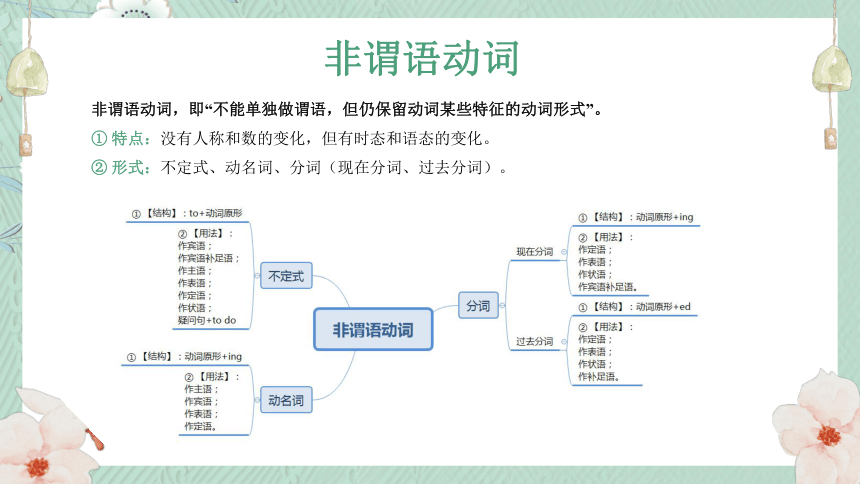


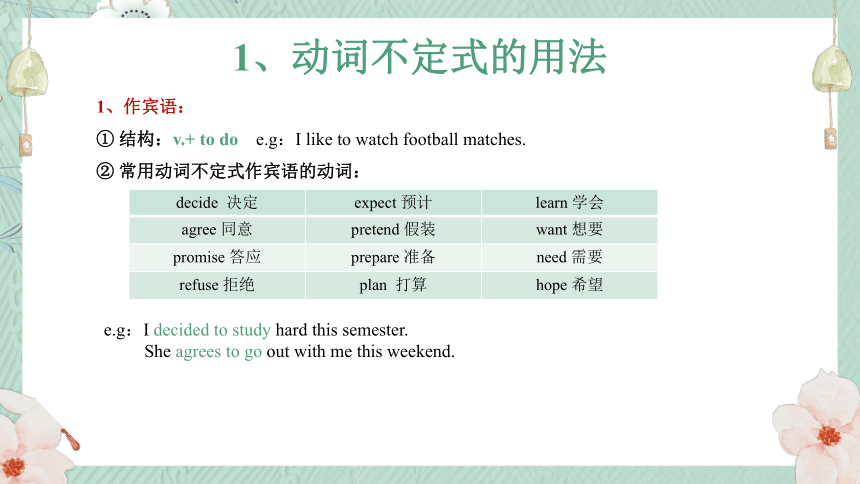
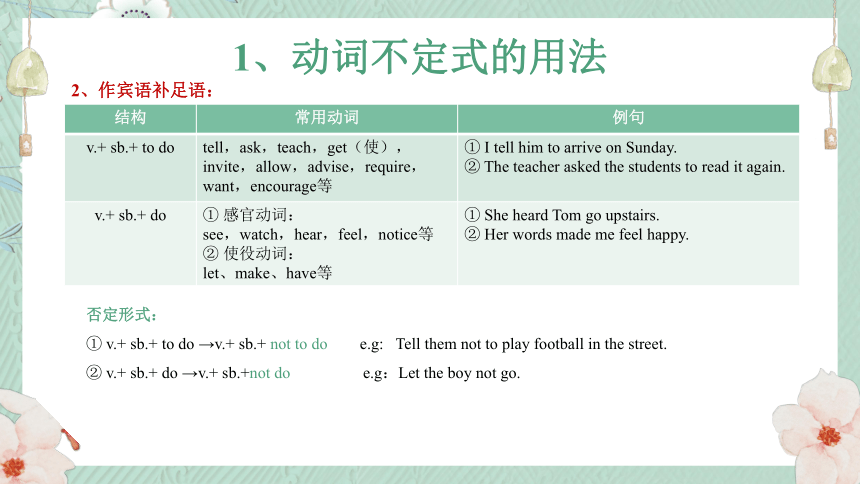
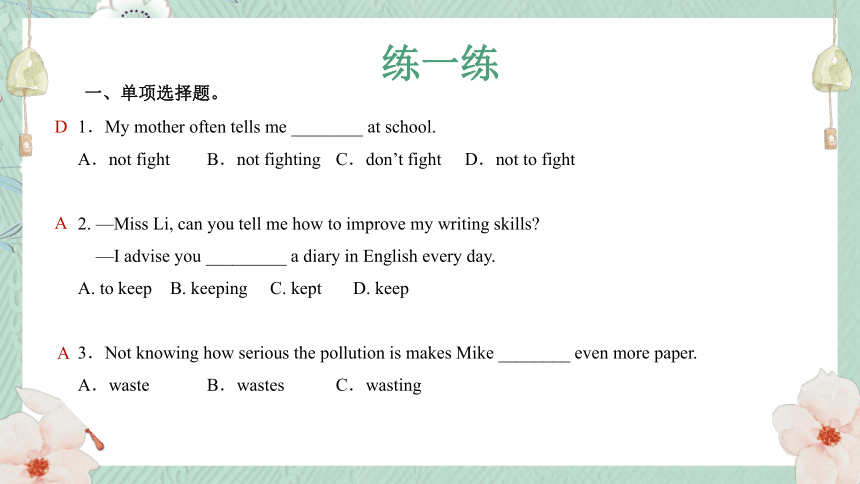
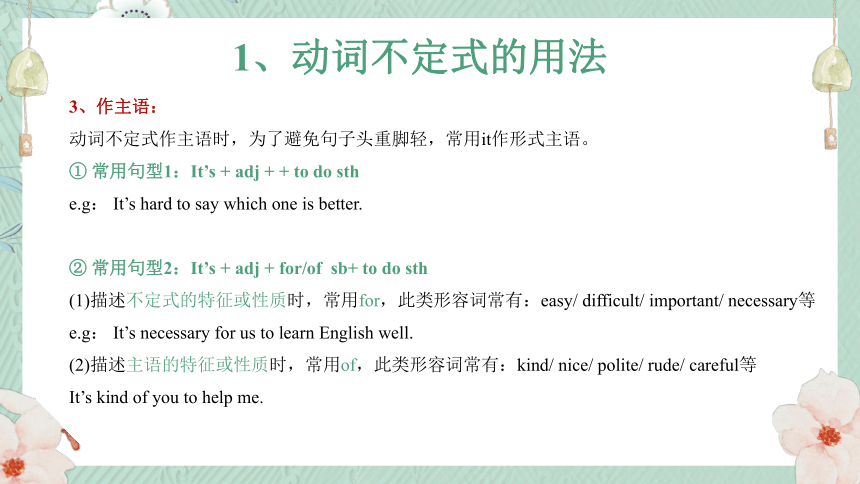
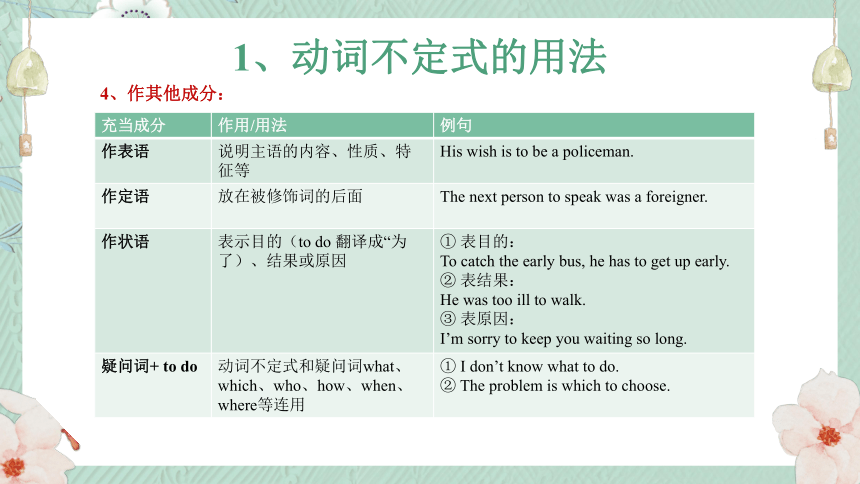
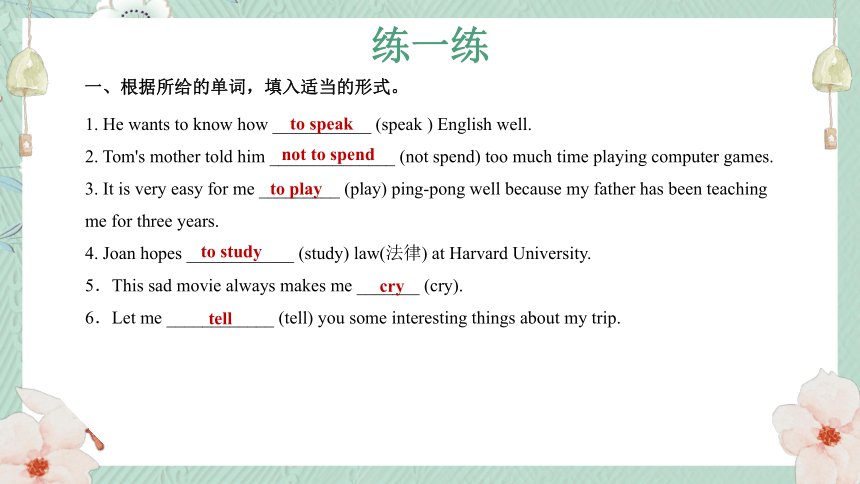
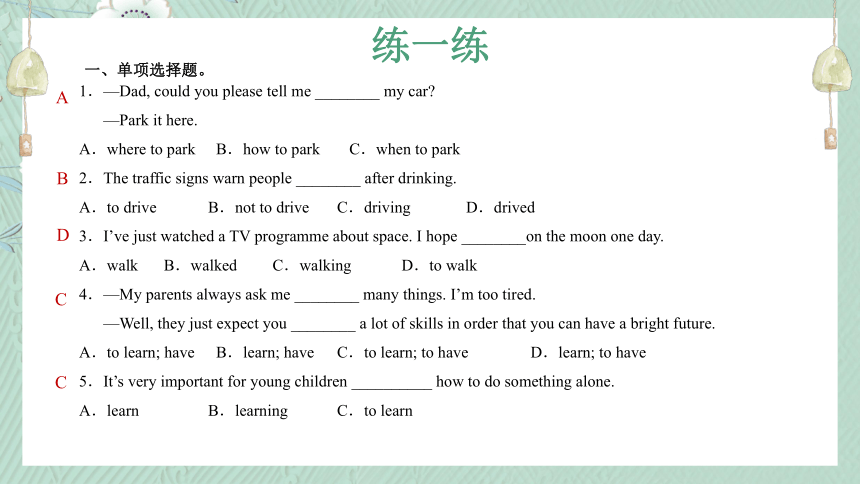
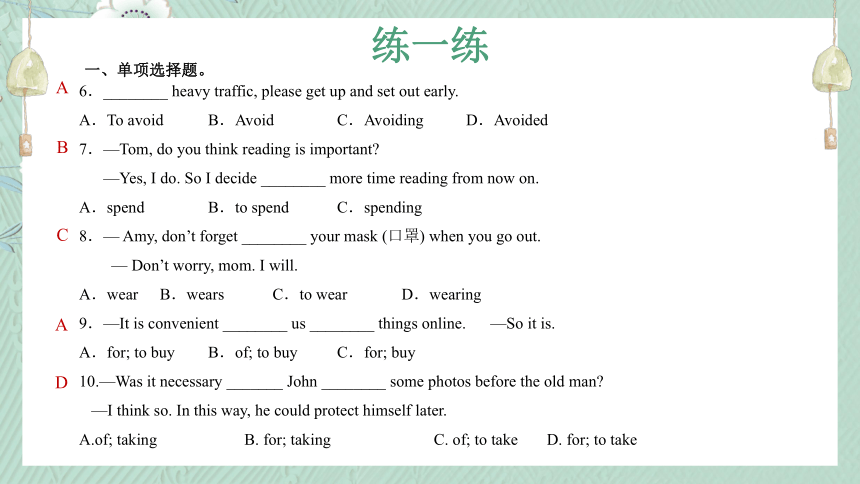
文档简介
(共34张PPT)
非谓语动词
初中语法
宾语从句,在复合句中起宾语作用的从句
非谓语动词
非谓语动词,即“不能单独做谓语,但仍保留动词某些特征的动词形式”。
① 特点:没有人称和数的变化,但有时态和语态的变化。
② 形式:不定式、动名词、分词(现在分词、过去分词)。
非谓语动词:
① 动词不定式
人称代词是为了避免重复,用来代替前面提到过的人、事物等名词的词,主要包括“你、我、他,她/它、你们、我们、他们/她们/它们”等代词。人称代词有人称、单复数以及格的变化。
1、动词不定式的结构
1、构成:
① 肯定句:to+动词原形 e.g:I want to read books.
② 否定句:not to +动词原形 e.g:My parents tell me not to play on the street.
2、特征:
不定式没有人称和数的变化,即“不受主语的人称和单复数的影响”。
She wants to open the presents.
They want to open the presents.
人称代词是为了避免重复,用来代替前面提到过的人、事物等名词的词,主要包括“你、我、他,她/它、你们、我们、他们/她们/它们”等代词。人称代词有人称、单复数以及格的变化。
1、动词不定式的用法
1、作宾语:
① 结构:v.+ to do e.g:I like to watch football matches.
② 常用动词不定式作宾语的动词:
decide 决定 expect 预计 learn 学会
agree 同意 pretend 假装 want 想要
promise 答应 prepare 准备 need 需要
refuse 拒绝 plan 打算 hope 希望
e.g:I decided to study hard this semester.
She agrees to go out with me this weekend.
人称代词是为了避免重复,用来代替前面提到过的人、事物等名词的词,主要包括“你、我、他,她/它、你们、我们、他们/她们/它们”等代词。人称代词有人称、单复数以及格的变化。
1、动词不定式的用法
2、作宾语补足语:
结构 常用动词 例句
v.+ sb.+ to do tell,ask,teach,get(使), invite,allow,advise,require, want,encourage等 ① I tell him to arrive on Sunday.
② The teacher asked the students to read it again.
v.+ sb.+ do ① 感官动词: see,watch,hear,feel,notice等 ② 使役动词: let、make、have等 ① She heard Tom go upstairs.
② Her words made me feel happy.
否定形式:
① v.+ sb.+ to do →v.+ sb.+ not to do e.g: Tell them not to play football in the street.
② v.+ sb.+ do →v.+ sb.+not do e.g:Let the boy not go.
练一练
1.My mother often tells me ________ at school.
A.not fight B.not fighting C.don’t fight D.not to fight
2. —Miss Li, can you tell me how to improve my writing skills
—I advise you _________ a diary in English every day.
A. to keep B. keeping C. kept D. keep
3.Not knowing how serious the pollution is makes Mike ________ even more paper.
A.waste B.wastes C.wasting
一、单项选择题。
D
A
A
人称代词是为了避免重复,用来代替前面提到过的人、事物等名词的词,主要包括“你、我、他,她/它、你们、我们、他们/她们/它们”等代词。人称代词有人称、单复数以及格的变化。
1、动词不定式的用法
3、作主语:
动词不定式作主语时,为了避免句子头重脚轻,常用it作形式主语。
① 常用句型1:It’s + adj + + to do sth
e.g: It’s hard to say which one is better.
② 常用句型2:It’s + adj + for/of sb+ to do sth
(1)描述不定式的特征或性质时,常用for,此类形容词常有:easy/ difficult/ important/ necessary等
e.g: It’s necessary for us to learn English well.
(2)描述主语的特征或性质时,常用of,此类形容词常有:kind/ nice/ polite/ rude/ careful等
It’s kind of you to help me.
人称代词是为了避免重复,用来代替前面提到过的人、事物等名词的词,主要包括“你、我、他,她/它、你们、我们、他们/她们/它们”等代词。人称代词有人称、单复数以及格的变化。
1、动词不定式的用法
4、作其他成分:
充当成分 作用/用法 例句
作表语 说明主语的内容、性质、特征等 His wish is to be a policeman.
作定语 放在被修饰词的后面 The next person to speak was a foreigner.
作状语 表示目的(to do 翻译成“为了)、结果或原因 ① 表目的:
To catch the early bus, he has to get up early.
② 表结果:
He was too ill to walk.
③ 表原因:
I’m sorry to keep you waiting so long.
疑问词+ to do 动词不定式和疑问词what、which、who、how、when、where等连用 ① I don’t know what to do.
② The problem is which to choose.
练一练
1. He wants to know how ___________ (speak ) English well.
2. Tom's mother told him ______________ (not spend) too much time playing computer games.
3. It is very easy for me _________ (play) ping-pong well because my father has been teaching me for three years.
4. Joan hopes ____________ (study) law(法律) at Harvard University.
5.This sad movie always makes me _______ (cry).
6.Let me ____________ (tell) you some interesting things about my trip.
一、根据所给的单词,填入适当的形式。
to speak
not to spend
to play
to study
cry
tell
练一练
1.—Dad, could you please tell me ________ my car
—Park it here.
A.where to park B.how to park C.when to park
2.The traffic signs warn people ________ after drinking.
A.to drive B.not to drive C.driving D.drived
3.I’ve just watched a TV programme about space. I hope ________on the moon one day.
A.walk B.walked C.walking D.to walk
4.—My parents always ask me ________ many things. I’m too tired.
—Well, they just expect you ________ a lot of skills in order that you can have a bright future.
A.to learn; have B.learn; have C.to learn; to have D.learn; to have
5.It’s very important for young children __________ how to do something alone.
A.learn B.learning C.to learn
一、单项选择题。
A
B
D
C
C
练一练
6.________ heavy traffic, please get up and set out early.
A.To avoid B.Avoid C.Avoiding D.Avoided
7.—Tom, do you think reading is important
—Yes, I do. So I decide ________ more time reading from now on.
A.spend B.to spend C.spending
8.— Amy, don’t forget ________ your mask (口罩) when you go out.
— Don’t worry, mom. I will.
A.wear B.wears C.to wear D.wearing
9.—It is convenient ________ us ________ things online. —So it is.
A.for; to buy B.of; to buy C.for; buy
10.—Was it necessary _______ John ________ some photos before the old man
—I think so. In this way, he could protect himself later.
A.of; taking B. for; taking C. of; to take D. for; to take
一、单项选择题。
A
B
C
A
D
练一练
11.We must _____ everyone _______ that keeping our city clean is our duty.
A.let; to know B.make; understand C.make; to understand D.have; to know
12.Hello, everyone, attention, please. Now let me tell you ______ to the Changsha park.
A.how to get B.what to get C.whom to get D.where to get
13.It’s possible for us ________ friends with the people around the world on the Internet now.
A.make B.making C.to making D.to make
一、单项选择题。
B
A
D
非谓语动词:
② 动名词
人称代词是为了避免重复,用来代替前面提到过的人、事物等名词的词,主要包括“你、我、他,她/它、你们、我们、他们/她们/它们”等代词。人称代词有人称、单复数以及格的变化。
2、动名词
1、构成:
① 动词原形+-ing e.g:Volunteering here is a dream come true for me.
2、用法:
动名词,在句中可作主语、宾语、表语、定语。
作主语:Running is his favourite sport.
作宾语:Tom enjoys running.
作表语:His favourite sport is running.
作定语:He plays a running game.
人称代词是为了避免重复,用来代替前面提到过的人、事物等名词的词,主要包括“你、我、他,她/它、你们、我们、他们/她们/它们”等代词。人称代词有人称、单复数以及格的变化。
2、动名词的用法
1、作主语:
动名词作主语,表示一种概念、习惯或经验。为避免句子头重脚轻,常用it作形式主语,而将真正的主语放到句子的末尾。
作主语的用法:
① 动名词直接作主语:Reading makes a man perfect.
【注意:动名词作主语,谓语动词用第三人称单数。】
②it作形式主语,动名词作真正主语:It is no good reading in the sun.
人称代词是为了避免重复,用来代替前面提到过的人、事物等名词的词,主要包括“你、我、他,她/它、你们、我们、他们/她们/它们”等代词。人称代词有人称、单复数以及格的变化。
2、动名词的用法
2、作宾语:
动名词作宾语,表示一般的习惯、抽象的行为或经常性的动作。可用于某些及物动词/ 某些短语动词/某些介词之后。
作宾语的用法:
① 动名词用于某些及物动词之后(常用动词如下):
finish 完成 practice 实践 consider 考虑 suggest 建议 enjoy 喜欢
mind 介意 keep 继续 allow 允许 avoid 避免 miss 错过
e.g:He finished doing homework.
I am practicing singing the new song.
人称代词是为了避免重复,用来代替前面提到过的人、事物等名词的词,主要包括“你、我、他,她/它、你们、我们、他们/她们/它们”等代词。人称代词有人称、单复数以及格的变化。
2、动名词的用法
作宾语的用法:
② 动名词用于某些固定短语之后(常用固定短语如下):
be worth doing sth. 值得做某事 be busy doing sth. 忙于做某事
keep on doing sth. 继续做某事 be / get used to doing sth. 习惯于做某事
give up doing sth. 放弃做某事 can't help doing sth. 禁不住做某事
can't help doing sth. 禁不住做某事 spend+时间+(in) doing sth. 花时间做某事
e.g:The book is worth reading.
He is busy cleaning the room.
人称代词是为了避免重复,用来代替前面提到过的人、事物等名词的词,主要包括“你、我、他,她/它、你们、我们、他们/她们/它们”等代词。人称代词有人称、单复数以及格的变化。
2、动名词的用法
作宾语的用法:
③ 动名词用于某些介词之后:
常用介词有:on, in, of, about, at, with, without, for, from,等。
e.g: She is good at runnning.
Can you prevent him from smoking
to 一般后面跟动词原形,但是如下短语需要跟动名词形式。
look forward to doing sth (盼望) pay attention to doing sth.(注意)
be used to doing sth. (习惯于) prefer doing sth to doing sth.(更喜欢)
e.g: I am looking forward to visiting my cousins this summer holiday..
I prefer reading to running.
人称代词是为了避免重复,用来代替前面提到过的人、事物等名词的词,主要包括“你、我、他,她/它、你们、我们、他们/她们/它们”等代词。人称代词有人称、单复数以及格的变化。
2、动名词的用法
作宾语的用法:
④ 动名词常跟动词及短语的记忆口诀:
完成实践值得忙(finish, practice, be worth, be busy)
继续习惯别放弃(keep on, be used to, give up)
考虑建议不禁想(consider, suggest, can't help, feel like)
喜欢思念要介意(enjoy, miss, mind)
练一练
1、—The art festival is coming. It’s a good chance to show ourselves.
— You are good at _________. And you will be the most popular star.
A. singing B. sing C. to sing D. sang
2、Most of the students are looking forward to ________ themselves after the exams.
A. work B. working C. relax D. relaxing
一、单项选择题。
A
D
人称代词是为了避免重复,用来代替前面提到过的人、事物等名词的词,主要包括“你、我、他,她/它、你们、我们、他们/她们/它们”等代词。人称代词有人称、单复数以及格的变化。
2、动名词的用法
3、作表语:
动名词作表语,用以说明主语的内容
e.g: Your task is cleaning the windows.(说明工作内容)
4、作定语:
动名词作定语,表示被修饰词的某种用途,常放在修饰词的前面
e.g: China is a developing country.
人称代词是为了避免重复,用来代替前面提到过的人、事物等名词的词,主要包括“你、我、他,她/它、你们、我们、他们/她们/它们”等代词。人称代词有人称、单复数以及格的变化。
2、动名词的用法
5、动名词作宾语和不定式作宾语的区别:
① 以下动词,跟动名词时表示动作已经发生,跟不定式时表示动作尚未发生:
remember to do sth. 记住要做某事(未做) remember doing sth. 记得曾经做过某事(已做)
forget to do sth. 忘记要做某事(未做) forget doing sth. 忘记曾经做过某事(已做)
regret to do sth. 对要做的事遗憾、后悔(未做) regret doing sth. 对做过的事遗憾、后悔 (已做)
e.g: I remembered closing the door when I left. (我记得我走的时候关门了)
Please remember to close the door when you leave.(离开时请记得关门。)
人称代词是为了避免重复,用来代替前面提到过的人、事物等名词的词,主要包括“你、我、他,她/它、你们、我们、他们/她们/它们”等代词。人称代词有人称、单复数以及格的变化。
2、动名词的用法
5、动名词作宾语和不定式作宾语的区别:
② 以下动词,跟动名词和不定式,差别很大:
try to do sth. 尽力/努力/企图做某事 try doing sth. 试验/试着做某事
can’t help to do sth 不能帮忙做某事 can’t help doing sth 禁不住做某事
mean to do sth 打算做某事 mean doing sth 意味着
go on to do sth 继续做另一件事 go on doing sth. 继续做原来在做的事
e.g:Please go on singing. (请继续歌唱。)
The band go on to play another mousic.(乐队接着演奏另一首歌曲。)
练一练
1.Maddy used to ________ to work, but now she is used to ________ because the road is crowded and she wants to exercise.
A.drive; walk B.drive; walking C.driving; walk
2.—Do you still remember ________ in that small house ten years ago
—Yes. I really regret ________ my hometown.
A.living; leaving B.to live; to leave C.living; leave
3.Please stop ________! It ________ in the cinema.
A.to smoke; doesn’t allow B.smoking; allows
C.to smoke; is not allowed D.smoking; is not allowed
4.—What a fantastic time we had in Happy Valley Theme Park!
—Yes. I couldn’t stop ________ photos in the park.
A.take B.took C.taking D.to take
一、单项选择题。
B
A
D
C
练一练
5.—Have you finished ________ the picture
—Not yet. I am busy these days.
A.draw B.to draw C.drawing D.drew
6.—What do you remember about Grade Seven, Jane
—I remember ________ the Old People’s Home.
A.visit B.to visit C.visiting D.visited
7.There is no doubt ________ Harry Potter is worth ________.
A.whether; reading B.if; to read C.that; reading D.that; being read
8.I’m really looking forward ________ with you on the project.
A.work B.to work C.working D.to working
9.—Would you mind my ________ here
—Better not. If you do that, you will be fined (罚款).
A.smoke B.to smoke C.smoking D.smokeing
一、单项选择题。
C
C
C
D
C
练一练
10.I asked Uncle Tom to stop ________ because he didn’t feel well.
A.smoke B.smoked C.to smoke D.smoking
11.I’m sleepy. I prefer ________ at home to ________ out for a walk.
A.sleeping; going B.to sleep; go C.slept; go D.sleep; going
12.I often practice ________ the piano in the morning, but my neighbors don’t mind ________ the sound.
A.play; hearing B.playing; hearing C.playing; to hear
13.— What would you like to drink, tea or coffee
— Well, I used to drink coffee. But now I ________ tea. I think tea is healthier.
A.used to B.am used to drink C.am used to drinking D.used to drinking
一、单项选择题。
D
A
B
C
非谓语动词:
③ 分词
人称代词是为了避免重复,用来代替前面提到过的人、事物等名词的词,主要包括“你、我、他,她/它、你们、我们、他们/她们/它们”等代词。人称代词有人称、单复数以及格的变化。
3、分词
1、构成:
分词分为现在分词和过去分词:
现在分词:由“动词原形+ing”构成,有主动、正在进行之意,所修饰的人或物是动作的执行者。
过去分词:由“动词原形+ed”构成,有被动、完成之意,所修饰的人或物是动作的承受者。
e.g:I heard him reading English in the morning.(正在读英语)
I hoped to see the problem solved peacefully.(问题被解决)
人称代词是为了避免重复,用来代替前面提到过的人、事物等名词的词,主要包括“你、我、他,她/它、你们、我们、他们/她们/它们”等代词。人称代词有人称、单复数以及格的变化。
3、分词
2、现在分词的用法:
成分 用法 例句
作定语 表示所修饰名词的动作正在进行,单个词要前置,短语要后置 The girl standing under the tree is Mary.
Who is the man talking to you
作表语 具有形容词的性质,说明主语的性质、特征;主语多是物 The book is interesting.
作状语 分词表示的动作和谓语动词的动作同时发生 Hearing the good news,Tom jumped for joy.
作补足语 说明宾语的性质、特征或正在做的动作。 ①用在感官动词后,表示正在进行的动作:see/ hear/ notice/watch/ feel/ smell等 ② 用在使役动词后,表示正在进行的动作:make/ have/ let等 ① Can you smell something burnig
② I let them working for me.
人称代词是为了避免重复,用来代替前面提到过的人、事物等名词的词,主要包括“你、我、他,她/它、你们、我们、他们/她们/它们”等代词。人称代词有人称、单复数以及格的变化。
3、分词
3、过去分词的用法:
成分 用法 例句
作定语 表示被修饰名词的动作已经完成。单个词要前置,短语要后置 Look at the broken glasses.
There is a bookshelf filled with books.
作表语 具有形容词的性质,说明主语的性质、状态;主语多是人 They are very surprised to hear the news.
作状语 表示时间、原因、条件、伴随和结果等,可改为相应的从句或并列句。 Given enough money, I'd buy that car.
=If I am given enough money, I'd buy that car.
作补足语 及物动词的过去分词作补足语,与宾语构成被动关系。 I hoped to see the problem solved peacefully.
练一练
1.The photo ________ ten years ago reminds me of those sweet memories.
A.was taken B.taken C.has taken D.took
2.________ ________ the neighbors, he became the pride of his family.
A.Praising by B.Praised by C.To praise D.Praise with
3.The little boy jumped up and down happily when he heard a bird ________ in the tree.
A.sing B.singing C.to sing D.sings
4.We should spend at least one hour every day ________ sports to keep healthy.
A.to play B.played C.playing D.play
5.— Where was Mr John at that time
— Em, we found ________ the robot. Something was wrong with it.
A.him fixing B.he fixed C.that he fixed D.he fixing
一、单项选择题。
B
B
B
C
A
练一练
6.—China’s C919 is expected to be put into commercial operation in early 2023.
—Great. It is the first plane ________ in China.
A.develop B.developing C.developed
7.—Your hair is so long, you need to have your hair ________.
—But the barber’s shop is ________.
A.to cut; closing B.cutting; open C.cut; closed
8.—There is something wrong with the TV.
—Don’t worry. I’ll get it ________ this afternoon.
A.repair B.repairing C.repaired
9.________ with gasoline cars, electric cars are more energy saving, making them cheaper to operate.
A.Compared B.To compare C.Comparing D.Compare
一、单项选择题。
C
C
C
A
练一练
10.The man is lying on the bed, ________ to the radio.
A.listen B.listened C.listens D.listening
11.—Hurry up, Jason! We’re going to the cinema, but the clothes still need ________.
—Don’t worry. I think thirty minutes is enough.
A.washing B.to wash C.washed D.wash
一、单项选择题。
D
A
非谓语动词
初中语法
宾语从句,在复合句中起宾语作用的从句
非谓语动词
非谓语动词,即“不能单独做谓语,但仍保留动词某些特征的动词形式”。
① 特点:没有人称和数的变化,但有时态和语态的变化。
② 形式:不定式、动名词、分词(现在分词、过去分词)。
非谓语动词:
① 动词不定式
人称代词是为了避免重复,用来代替前面提到过的人、事物等名词的词,主要包括“你、我、他,她/它、你们、我们、他们/她们/它们”等代词。人称代词有人称、单复数以及格的变化。
1、动词不定式的结构
1、构成:
① 肯定句:to+动词原形 e.g:I want to read books.
② 否定句:not to +动词原形 e.g:My parents tell me not to play on the street.
2、特征:
不定式没有人称和数的变化,即“不受主语的人称和单复数的影响”。
She wants to open the presents.
They want to open the presents.
人称代词是为了避免重复,用来代替前面提到过的人、事物等名词的词,主要包括“你、我、他,她/它、你们、我们、他们/她们/它们”等代词。人称代词有人称、单复数以及格的变化。
1、动词不定式的用法
1、作宾语:
① 结构:v.+ to do e.g:I like to watch football matches.
② 常用动词不定式作宾语的动词:
decide 决定 expect 预计 learn 学会
agree 同意 pretend 假装 want 想要
promise 答应 prepare 准备 need 需要
refuse 拒绝 plan 打算 hope 希望
e.g:I decided to study hard this semester.
She agrees to go out with me this weekend.
人称代词是为了避免重复,用来代替前面提到过的人、事物等名词的词,主要包括“你、我、他,她/它、你们、我们、他们/她们/它们”等代词。人称代词有人称、单复数以及格的变化。
1、动词不定式的用法
2、作宾语补足语:
结构 常用动词 例句
v.+ sb.+ to do tell,ask,teach,get(使), invite,allow,advise,require, want,encourage等 ① I tell him to arrive on Sunday.
② The teacher asked the students to read it again.
v.+ sb.+ do ① 感官动词: see,watch,hear,feel,notice等 ② 使役动词: let、make、have等 ① She heard Tom go upstairs.
② Her words made me feel happy.
否定形式:
① v.+ sb.+ to do →v.+ sb.+ not to do e.g: Tell them not to play football in the street.
② v.+ sb.+ do →v.+ sb.+not do e.g:Let the boy not go.
练一练
1.My mother often tells me ________ at school.
A.not fight B.not fighting C.don’t fight D.not to fight
2. —Miss Li, can you tell me how to improve my writing skills
—I advise you _________ a diary in English every day.
A. to keep B. keeping C. kept D. keep
3.Not knowing how serious the pollution is makes Mike ________ even more paper.
A.waste B.wastes C.wasting
一、单项选择题。
D
A
A
人称代词是为了避免重复,用来代替前面提到过的人、事物等名词的词,主要包括“你、我、他,她/它、你们、我们、他们/她们/它们”等代词。人称代词有人称、单复数以及格的变化。
1、动词不定式的用法
3、作主语:
动词不定式作主语时,为了避免句子头重脚轻,常用it作形式主语。
① 常用句型1:It’s + adj + + to do sth
e.g: It’s hard to say which one is better.
② 常用句型2:It’s + adj + for/of sb+ to do sth
(1)描述不定式的特征或性质时,常用for,此类形容词常有:easy/ difficult/ important/ necessary等
e.g: It’s necessary for us to learn English well.
(2)描述主语的特征或性质时,常用of,此类形容词常有:kind/ nice/ polite/ rude/ careful等
It’s kind of you to help me.
人称代词是为了避免重复,用来代替前面提到过的人、事物等名词的词,主要包括“你、我、他,她/它、你们、我们、他们/她们/它们”等代词。人称代词有人称、单复数以及格的变化。
1、动词不定式的用法
4、作其他成分:
充当成分 作用/用法 例句
作表语 说明主语的内容、性质、特征等 His wish is to be a policeman.
作定语 放在被修饰词的后面 The next person to speak was a foreigner.
作状语 表示目的(to do 翻译成“为了)、结果或原因 ① 表目的:
To catch the early bus, he has to get up early.
② 表结果:
He was too ill to walk.
③ 表原因:
I’m sorry to keep you waiting so long.
疑问词+ to do 动词不定式和疑问词what、which、who、how、when、where等连用 ① I don’t know what to do.
② The problem is which to choose.
练一练
1. He wants to know how ___________ (speak ) English well.
2. Tom's mother told him ______________ (not spend) too much time playing computer games.
3. It is very easy for me _________ (play) ping-pong well because my father has been teaching me for three years.
4. Joan hopes ____________ (study) law(法律) at Harvard University.
5.This sad movie always makes me _______ (cry).
6.Let me ____________ (tell) you some interesting things about my trip.
一、根据所给的单词,填入适当的形式。
to speak
not to spend
to play
to study
cry
tell
练一练
1.—Dad, could you please tell me ________ my car
—Park it here.
A.where to park B.how to park C.when to park
2.The traffic signs warn people ________ after drinking.
A.to drive B.not to drive C.driving D.drived
3.I’ve just watched a TV programme about space. I hope ________on the moon one day.
A.walk B.walked C.walking D.to walk
4.—My parents always ask me ________ many things. I’m too tired.
—Well, they just expect you ________ a lot of skills in order that you can have a bright future.
A.to learn; have B.learn; have C.to learn; to have D.learn; to have
5.It’s very important for young children __________ how to do something alone.
A.learn B.learning C.to learn
一、单项选择题。
A
B
D
C
C
练一练
6.________ heavy traffic, please get up and set out early.
A.To avoid B.Avoid C.Avoiding D.Avoided
7.—Tom, do you think reading is important
—Yes, I do. So I decide ________ more time reading from now on.
A.spend B.to spend C.spending
8.— Amy, don’t forget ________ your mask (口罩) when you go out.
— Don’t worry, mom. I will.
A.wear B.wears C.to wear D.wearing
9.—It is convenient ________ us ________ things online. —So it is.
A.for; to buy B.of; to buy C.for; buy
10.—Was it necessary _______ John ________ some photos before the old man
—I think so. In this way, he could protect himself later.
A.of; taking B. for; taking C. of; to take D. for; to take
一、单项选择题。
A
B
C
A
D
练一练
11.We must _____ everyone _______ that keeping our city clean is our duty.
A.let; to know B.make; understand C.make; to understand D.have; to know
12.Hello, everyone, attention, please. Now let me tell you ______ to the Changsha park.
A.how to get B.what to get C.whom to get D.where to get
13.It’s possible for us ________ friends with the people around the world on the Internet now.
A.make B.making C.to making D.to make
一、单项选择题。
B
A
D
非谓语动词:
② 动名词
人称代词是为了避免重复,用来代替前面提到过的人、事物等名词的词,主要包括“你、我、他,她/它、你们、我们、他们/她们/它们”等代词。人称代词有人称、单复数以及格的变化。
2、动名词
1、构成:
① 动词原形+-ing e.g:Volunteering here is a dream come true for me.
2、用法:
动名词,在句中可作主语、宾语、表语、定语。
作主语:Running is his favourite sport.
作宾语:Tom enjoys running.
作表语:His favourite sport is running.
作定语:He plays a running game.
人称代词是为了避免重复,用来代替前面提到过的人、事物等名词的词,主要包括“你、我、他,她/它、你们、我们、他们/她们/它们”等代词。人称代词有人称、单复数以及格的变化。
2、动名词的用法
1、作主语:
动名词作主语,表示一种概念、习惯或经验。为避免句子头重脚轻,常用it作形式主语,而将真正的主语放到句子的末尾。
作主语的用法:
① 动名词直接作主语:Reading makes a man perfect.
【注意:动名词作主语,谓语动词用第三人称单数。】
②it作形式主语,动名词作真正主语:It is no good reading in the sun.
人称代词是为了避免重复,用来代替前面提到过的人、事物等名词的词,主要包括“你、我、他,她/它、你们、我们、他们/她们/它们”等代词。人称代词有人称、单复数以及格的变化。
2、动名词的用法
2、作宾语:
动名词作宾语,表示一般的习惯、抽象的行为或经常性的动作。可用于某些及物动词/ 某些短语动词/某些介词之后。
作宾语的用法:
① 动名词用于某些及物动词之后(常用动词如下):
finish 完成 practice 实践 consider 考虑 suggest 建议 enjoy 喜欢
mind 介意 keep 继续 allow 允许 avoid 避免 miss 错过
e.g:He finished doing homework.
I am practicing singing the new song.
人称代词是为了避免重复,用来代替前面提到过的人、事物等名词的词,主要包括“你、我、他,她/它、你们、我们、他们/她们/它们”等代词。人称代词有人称、单复数以及格的变化。
2、动名词的用法
作宾语的用法:
② 动名词用于某些固定短语之后(常用固定短语如下):
be worth doing sth. 值得做某事 be busy doing sth. 忙于做某事
keep on doing sth. 继续做某事 be / get used to doing sth. 习惯于做某事
give up doing sth. 放弃做某事 can't help doing sth. 禁不住做某事
can't help doing sth. 禁不住做某事 spend+时间+(in) doing sth. 花时间做某事
e.g:The book is worth reading.
He is busy cleaning the room.
人称代词是为了避免重复,用来代替前面提到过的人、事物等名词的词,主要包括“你、我、他,她/它、你们、我们、他们/她们/它们”等代词。人称代词有人称、单复数以及格的变化。
2、动名词的用法
作宾语的用法:
③ 动名词用于某些介词之后:
常用介词有:on, in, of, about, at, with, without, for, from,等。
e.g: She is good at runnning.
Can you prevent him from smoking
to 一般后面跟动词原形,但是如下短语需要跟动名词形式。
look forward to doing sth (盼望) pay attention to doing sth.(注意)
be used to doing sth. (习惯于) prefer doing sth to doing sth.(更喜欢)
e.g: I am looking forward to visiting my cousins this summer holiday..
I prefer reading to running.
人称代词是为了避免重复,用来代替前面提到过的人、事物等名词的词,主要包括“你、我、他,她/它、你们、我们、他们/她们/它们”等代词。人称代词有人称、单复数以及格的变化。
2、动名词的用法
作宾语的用法:
④ 动名词常跟动词及短语的记忆口诀:
完成实践值得忙(finish, practice, be worth, be busy)
继续习惯别放弃(keep on, be used to, give up)
考虑建议不禁想(consider, suggest, can't help, feel like)
喜欢思念要介意(enjoy, miss, mind)
练一练
1、—The art festival is coming. It’s a good chance to show ourselves.
— You are good at _________. And you will be the most popular star.
A. singing B. sing C. to sing D. sang
2、Most of the students are looking forward to ________ themselves after the exams.
A. work B. working C. relax D. relaxing
一、单项选择题。
A
D
人称代词是为了避免重复,用来代替前面提到过的人、事物等名词的词,主要包括“你、我、他,她/它、你们、我们、他们/她们/它们”等代词。人称代词有人称、单复数以及格的变化。
2、动名词的用法
3、作表语:
动名词作表语,用以说明主语的内容
e.g: Your task is cleaning the windows.(说明工作内容)
4、作定语:
动名词作定语,表示被修饰词的某种用途,常放在修饰词的前面
e.g: China is a developing country.
人称代词是为了避免重复,用来代替前面提到过的人、事物等名词的词,主要包括“你、我、他,她/它、你们、我们、他们/她们/它们”等代词。人称代词有人称、单复数以及格的变化。
2、动名词的用法
5、动名词作宾语和不定式作宾语的区别:
① 以下动词,跟动名词时表示动作已经发生,跟不定式时表示动作尚未发生:
remember to do sth. 记住要做某事(未做) remember doing sth. 记得曾经做过某事(已做)
forget to do sth. 忘记要做某事(未做) forget doing sth. 忘记曾经做过某事(已做)
regret to do sth. 对要做的事遗憾、后悔(未做) regret doing sth. 对做过的事遗憾、后悔 (已做)
e.g: I remembered closing the door when I left. (我记得我走的时候关门了)
Please remember to close the door when you leave.(离开时请记得关门。)
人称代词是为了避免重复,用来代替前面提到过的人、事物等名词的词,主要包括“你、我、他,她/它、你们、我们、他们/她们/它们”等代词。人称代词有人称、单复数以及格的变化。
2、动名词的用法
5、动名词作宾语和不定式作宾语的区别:
② 以下动词,跟动名词和不定式,差别很大:
try to do sth. 尽力/努力/企图做某事 try doing sth. 试验/试着做某事
can’t help to do sth 不能帮忙做某事 can’t help doing sth 禁不住做某事
mean to do sth 打算做某事 mean doing sth 意味着
go on to do sth 继续做另一件事 go on doing sth. 继续做原来在做的事
e.g:Please go on singing. (请继续歌唱。)
The band go on to play another mousic.(乐队接着演奏另一首歌曲。)
练一练
1.Maddy used to ________ to work, but now she is used to ________ because the road is crowded and she wants to exercise.
A.drive; walk B.drive; walking C.driving; walk
2.—Do you still remember ________ in that small house ten years ago
—Yes. I really regret ________ my hometown.
A.living; leaving B.to live; to leave C.living; leave
3.Please stop ________! It ________ in the cinema.
A.to smoke; doesn’t allow B.smoking; allows
C.to smoke; is not allowed D.smoking; is not allowed
4.—What a fantastic time we had in Happy Valley Theme Park!
—Yes. I couldn’t stop ________ photos in the park.
A.take B.took C.taking D.to take
一、单项选择题。
B
A
D
C
练一练
5.—Have you finished ________ the picture
—Not yet. I am busy these days.
A.draw B.to draw C.drawing D.drew
6.—What do you remember about Grade Seven, Jane
—I remember ________ the Old People’s Home.
A.visit B.to visit C.visiting D.visited
7.There is no doubt ________ Harry Potter is worth ________.
A.whether; reading B.if; to read C.that; reading D.that; being read
8.I’m really looking forward ________ with you on the project.
A.work B.to work C.working D.to working
9.—Would you mind my ________ here
—Better not. If you do that, you will be fined (罚款).
A.smoke B.to smoke C.smoking D.smokeing
一、单项选择题。
C
C
C
D
C
练一练
10.I asked Uncle Tom to stop ________ because he didn’t feel well.
A.smoke B.smoked C.to smoke D.smoking
11.I’m sleepy. I prefer ________ at home to ________ out for a walk.
A.sleeping; going B.to sleep; go C.slept; go D.sleep; going
12.I often practice ________ the piano in the morning, but my neighbors don’t mind ________ the sound.
A.play; hearing B.playing; hearing C.playing; to hear
13.— What would you like to drink, tea or coffee
— Well, I used to drink coffee. But now I ________ tea. I think tea is healthier.
A.used to B.am used to drink C.am used to drinking D.used to drinking
一、单项选择题。
D
A
B
C
非谓语动词:
③ 分词
人称代词是为了避免重复,用来代替前面提到过的人、事物等名词的词,主要包括“你、我、他,她/它、你们、我们、他们/她们/它们”等代词。人称代词有人称、单复数以及格的变化。
3、分词
1、构成:
分词分为现在分词和过去分词:
现在分词:由“动词原形+ing”构成,有主动、正在进行之意,所修饰的人或物是动作的执行者。
过去分词:由“动词原形+ed”构成,有被动、完成之意,所修饰的人或物是动作的承受者。
e.g:I heard him reading English in the morning.(正在读英语)
I hoped to see the problem solved peacefully.(问题被解决)
人称代词是为了避免重复,用来代替前面提到过的人、事物等名词的词,主要包括“你、我、他,她/它、你们、我们、他们/她们/它们”等代词。人称代词有人称、单复数以及格的变化。
3、分词
2、现在分词的用法:
成分 用法 例句
作定语 表示所修饰名词的动作正在进行,单个词要前置,短语要后置 The girl standing under the tree is Mary.
Who is the man talking to you
作表语 具有形容词的性质,说明主语的性质、特征;主语多是物 The book is interesting.
作状语 分词表示的动作和谓语动词的动作同时发生 Hearing the good news,Tom jumped for joy.
作补足语 说明宾语的性质、特征或正在做的动作。 ①用在感官动词后,表示正在进行的动作:see/ hear/ notice/watch/ feel/ smell等 ② 用在使役动词后,表示正在进行的动作:make/ have/ let等 ① Can you smell something burnig
② I let them working for me.
人称代词是为了避免重复,用来代替前面提到过的人、事物等名词的词,主要包括“你、我、他,她/它、你们、我们、他们/她们/它们”等代词。人称代词有人称、单复数以及格的变化。
3、分词
3、过去分词的用法:
成分 用法 例句
作定语 表示被修饰名词的动作已经完成。单个词要前置,短语要后置 Look at the broken glasses.
There is a bookshelf filled with books.
作表语 具有形容词的性质,说明主语的性质、状态;主语多是人 They are very surprised to hear the news.
作状语 表示时间、原因、条件、伴随和结果等,可改为相应的从句或并列句。 Given enough money, I'd buy that car.
=If I am given enough money, I'd buy that car.
作补足语 及物动词的过去分词作补足语,与宾语构成被动关系。 I hoped to see the problem solved peacefully.
练一练
1.The photo ________ ten years ago reminds me of those sweet memories.
A.was taken B.taken C.has taken D.took
2.________ ________ the neighbors, he became the pride of his family.
A.Praising by B.Praised by C.To praise D.Praise with
3.The little boy jumped up and down happily when he heard a bird ________ in the tree.
A.sing B.singing C.to sing D.sings
4.We should spend at least one hour every day ________ sports to keep healthy.
A.to play B.played C.playing D.play
5.— Where was Mr John at that time
— Em, we found ________ the robot. Something was wrong with it.
A.him fixing B.he fixed C.that he fixed D.he fixing
一、单项选择题。
B
B
B
C
A
练一练
6.—China’s C919 is expected to be put into commercial operation in early 2023.
—Great. It is the first plane ________ in China.
A.develop B.developing C.developed
7.—Your hair is so long, you need to have your hair ________.
—But the barber’s shop is ________.
A.to cut; closing B.cutting; open C.cut; closed
8.—There is something wrong with the TV.
—Don’t worry. I’ll get it ________ this afternoon.
A.repair B.repairing C.repaired
9.________ with gasoline cars, electric cars are more energy saving, making them cheaper to operate.
A.Compared B.To compare C.Comparing D.Compare
一、单项选择题。
C
C
C
A
练一练
10.The man is lying on the bed, ________ to the radio.
A.listen B.listened C.listens D.listening
11.—Hurry up, Jason! We’re going to the cinema, but the clothes still need ________.
—Don’t worry. I think thirty minutes is enough.
A.washing B.to wash C.washed D.wash
一、单项选择题。
D
A
同课章节目录
- 词法
- 名词
- 动词和动词短语
- 动词语态
- 动词时态
- 助动词和情态动词
- 非谓语动词
- 冠词
- 代词
- 数词和量词
- 形容词副词及其比较等级
- 介词和介词短语
- 连词和感叹词
- 构词法
- 相似、相近词比较
- 句法
- 陈述句
- 一般疑问句和否定疑问句
- 特殊疑问句及选择疑问句
- 反意疑问句
- 存在句(There be句型)
- 宾语从句
- 定语从句
- 状语从句
- 主谓一致问题
- 简单句
- 并列句
- 复合句
- 主谓一致
- 主、表语从句
- 名词性从句
- 直接引语和间接引语
- 虚拟语气
- 感叹句
- 强调句
- 倒装句
- 祈使句
- 句子的成分
- 句子的分类
- 题型专区
- 单项选择部分
- 易错题
- 完形填空
- 阅读理解
- 词汇练习
- 听说训练
- 句型转换
- 补全对话
- 短文改错
- 翻译
- 书面表达
- 任务型阅读
- 语法填空
- 其他资料
